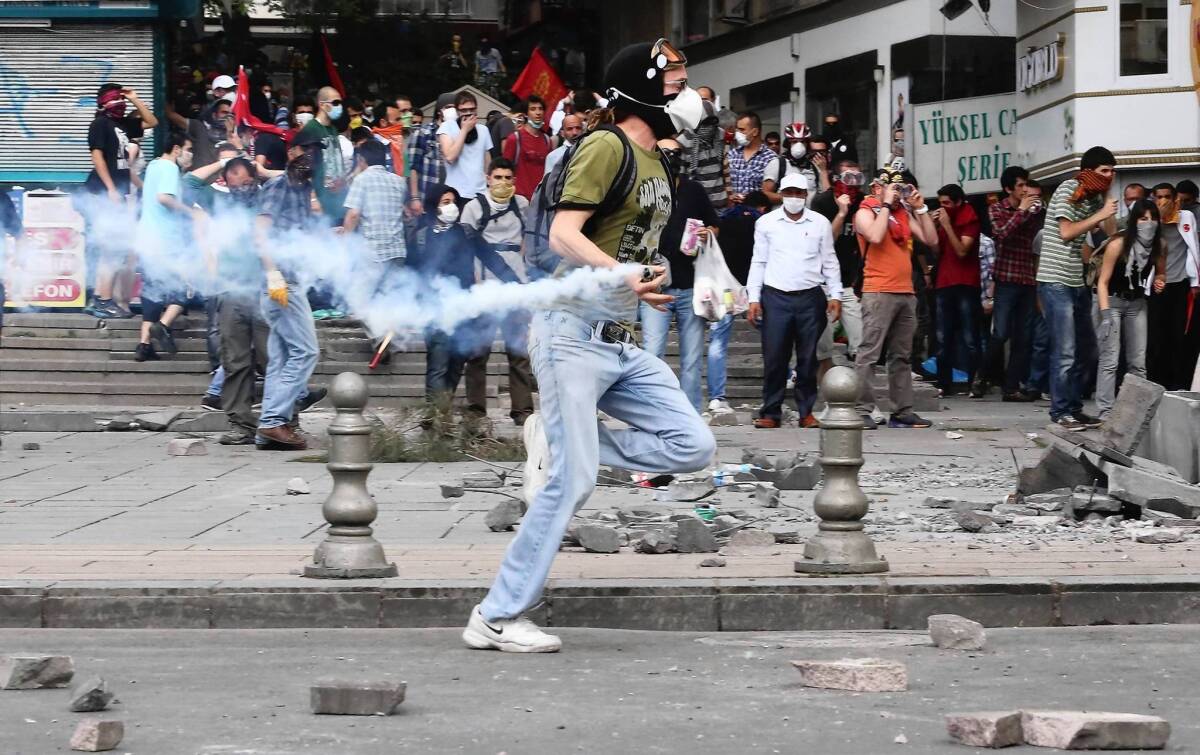Thousands in Turkey continue protest over plan to bulldoze park

- Share via
ISTANBUL, Turkey — A weekend of protest in Turkey has left the country reeling, with thousands of dissidents taking to the streets after a brutal police crackdown, presenting the government with the most cohesive challenge in its more than a decade in power.
“The government is passing laws that go against our freedom, that take away our rights,” said 31-year-old Derya Bozkurt as she stood in the heart of Taksim Square in central Istanbul on Sunday evening. She was drinking a beer and smoking a cigar — powerful statements in present-day Turkey, where Islamists frown on alcohol consumption and cigar smoking is hardly the social norm for a woman.
“The government doesn’t listen. They work only for the people who will vote for them,” she added.
Thousands of people filled the park, singing, drinking and feasting on fresh chunks of watermelon, barbecued corn cobs and oysters straight from the shells. Young couples kissed — a retort to a government morality campaign calling for greater modesty. The acerbic sting of tear gas still lingered from protests that provoked a strong police response Friday.
The demonstrations began as a reaction to government plans to bulldoze Taksim Gezi Park, one of central Istanbul’s last major green areas, and replace it with a shopping mall and a replica of an Ottoman-era barracks. By Saturday, the protests had spread to cities around the country and had blossomed into a broad repudiation of the government of Prime Minister Recep Tayyip Erdogan, who is seen as an increasingly authoritarian figure — even as he wins plaudits internationally for improving Turkey’s economy and making it an increasingly important player on the global stage.
Protesters carried placards reading “Resign, Erdogan” as they took to the alleys and boulevards surrounding the square during two days of street violence.
“Demolishing our park was just the trigger,” said one protester, an engineer who stood beneath a sycamore tree and would give only his first name, Murad. “The government needs to understand that it can’t just decide everything alone. In a democracy, governments represent the people, they don’t just get to do whatever they want.”
Plans to redevelop the park were pushed through last year by Erdogan’s Justice and Development Party, or AKP, despite considerable opposition.
The AKP, a center-right nationalist party with Islamist leanings, dominates the parliament and retains significant support in the country, appealing to a conservative Muslim base.
It has, despite the global financial crisis, overseen a decade of rapid, sustained growth, driven in part by increased foreign investment and large-scale construction projects. Per capita income has risen steeply.
Meanwhile, by scaling back the power of the country’s military, it has made the country more stable and less coup-prone.
However, many people view the government as increasingly intolerant of criticism while leading a creeping assault on the country’s secular identity, which has been a defining force since the founding of modern Turkey by Kemal Ataturk in 1923. Erdogan, who rose to power in 2002, came out of the radical Islamist underground, stirring fears among secular Turks.
For some, those fears were validated by recent moves to curb alcohol sales, and by the government’s emphasis on Turkey’s Islamic history and strictures.
In addition, the press has been targeted for intimidation, with Turkey becoming “the world’s biggest prison for journalists,” according to Reporters Without Borders. The country’s rich-poor gap is among the biggest in the developed world. Violence against women is widespread.
“The government needs to listen more carefully to what people are thinking about, catering to more communities than just its own,” said Hugh Pope, a leading Turkey expert and head of the International Crisis Group’s Turkey-Cyprus project.
“Turkey has a single-party government which is able to do what it likes, which is really a problem of majoritarianism. So people start to feel that they don’t have anything in common with this government,” he added.
During the weekend protests, rights groups complained that police relied excessively on water cannons, plastic bullets and tear gas, causing scores of injuries and necessitating makeshift field hospitals. One 23-year-old student from Istanbul Technical University lost an eye after being shot in the face at close range with a plastic bullet.
“The police were so cruel to people, they treated them like animals,” said Ozan Dogan, who works in a tourism office and joined protests after seeing the chaos outside his office. “They were firing gas at even normal people just walking past. No government should do that.”
A court reportedly issued a stay of execution on the Taksim Gezi Park project on Friday, yet Erdogan insisted that the project would continue. He was quoted as characterizing protesters as “extremists” who were “running wild.”
The protests may give him cause for concern. The AKP last year moved to vastly expand presidential powers and Erdogan, who cannot serve another term as prime minister, is widely expected to run for president in 2014. If he were to win and serve two five-year terms, he could lead Turkey until 2024.
As night set in on Sunday, thousands of protesters marched along Istiklal Street, beating drums and rattling the shutters pulled down tight on storefronts, cheering and calling for Erdogan’s resignation.
Bozkurt stood puffing away on her cigar, one hand clasping her partner’s, the other holding her bottle of beer.
“I wouldn’t even have been drinking a beer tonight, but the government treats us like children — tells us you can’t drink, you can’t kiss, you can’t have fresh air in a park,” she said. “We won’t stop until they listen.”
Johnson is a special correspondent.
More to Read
Sign up for Essential California
The most important California stories and recommendations in your inbox every morning.
You may occasionally receive promotional content from the Los Angeles Times.













